BUSI 2701: Fundamentals of International Business - Singapore Analysis
VerifiedAdded on 2021/08/16
|8
|1905
|96
Report
AI Summary
This report provides a comprehensive country analysis of Singapore, examining its macro environment, political stability, economic conditions, and cultural issues. The analysis highlights Singapore's strong economy, excellent infrastructure, and strategic location, making it attractive for international business. The report details factors such as GDP, trade partners, and the political landscape, including the dominance of the People's Action Party. It also assesses cultural considerations, including the importance of family and authority in business ethics. The report outlines the benefits, such as an open economy and ease of doing business, and risks, including limited skilled labor and government control over certain sectors. Based on this analysis, the report recommends foreign direct investment in Singapore, emphasizing its low tax rates, low corruption, and stable economy, while advising consideration of cultural nuances and potential risks before investment.
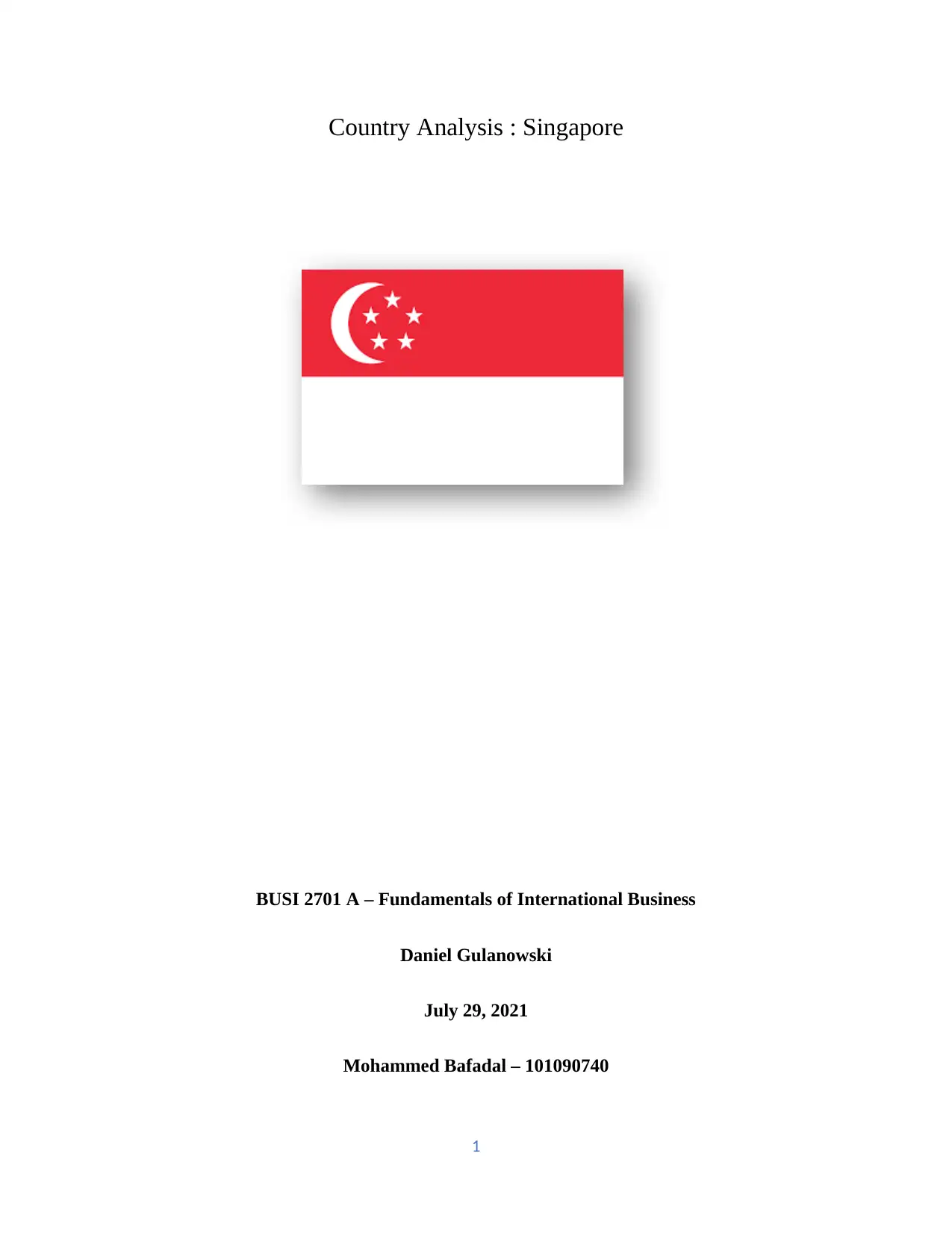
Country Analysis : Singapore
BUSI 2701 A – Fundamentals of International Business
Daniel Gulanowski
July 29, 2021
Mohammed Bafadal – 101090740
1
BUSI 2701 A – Fundamentals of International Business
Daniel Gulanowski
July 29, 2021
Mohammed Bafadal – 101090740
1
Paraphrase This Document
Need a fresh take? Get an instant paraphrase of this document with our AI Paraphraser
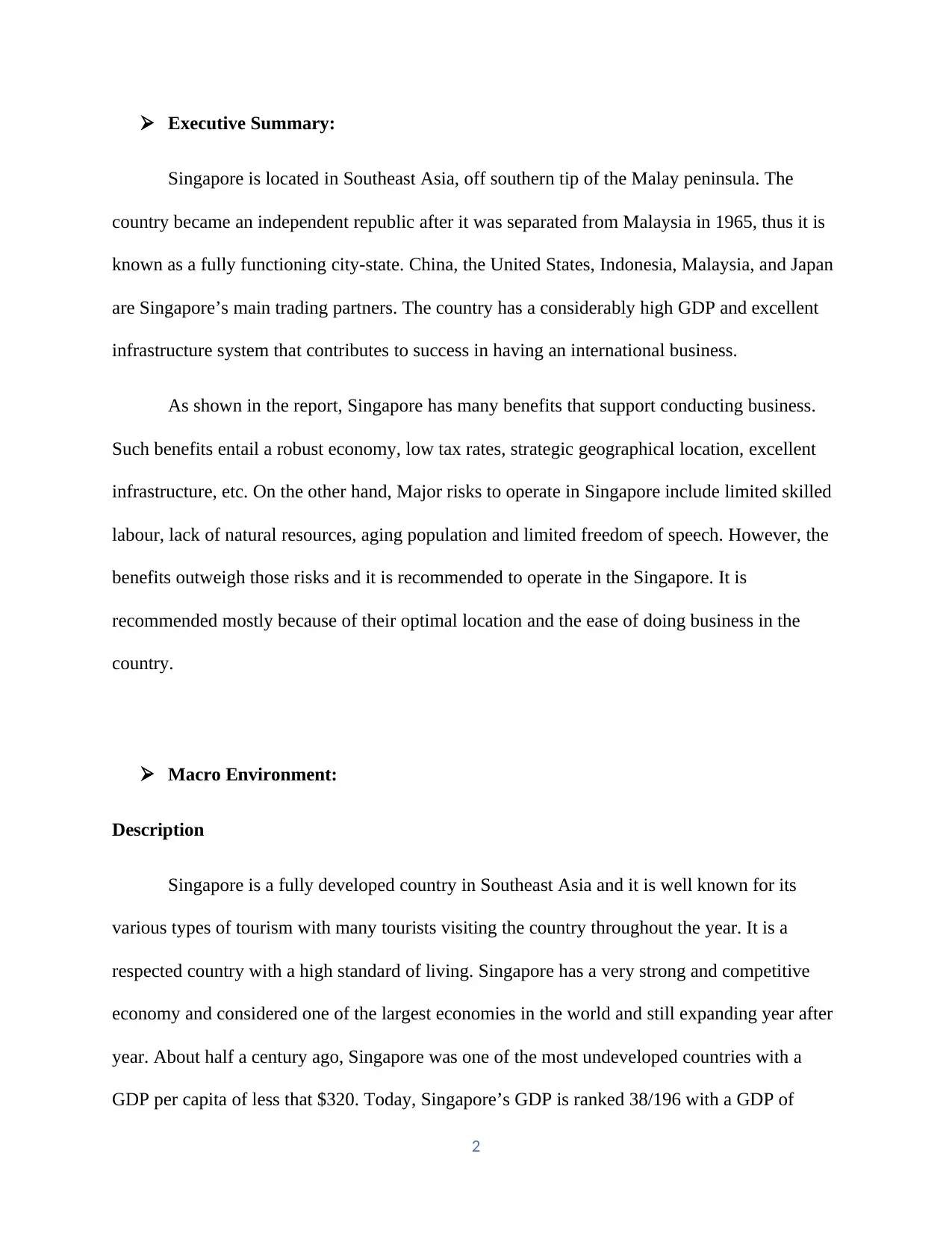
Executive Summary:
Singapore is located in Southeast Asia, off southern tip of the Malay peninsula. The
country became an independent republic after it was separated from Malaysia in 1965, thus it is
known as a fully functioning city-state. China, the United States, Indonesia, Malaysia, and Japan
are Singapore’s main trading partners. The country has a considerably high GDP and excellent
infrastructure system that contributes to success in having an international business.
As shown in the report, Singapore has many benefits that support conducting business.
Such benefits entail a robust economy, low tax rates, strategic geographical location, excellent
infrastructure, etc. On the other hand, Major risks to operate in Singapore include limited skilled
labour, lack of natural resources, aging population and limited freedom of speech. However, the
benefits outweigh those risks and it is recommended to operate in the Singapore. It is
recommended mostly because of their optimal location and the ease of doing business in the
country.
Macro Environment:
Description
Singapore is a fully developed country in Southeast Asia and it is well known for its
various types of tourism with many tourists visiting the country throughout the year. It is a
respected country with a high standard of living. Singapore has a very strong and competitive
economy and considered one of the largest economies in the world and still expanding year after
year. About half a century ago, Singapore was one of the most undeveloped countries with a
GDP per capita of less that $320. Today, Singapore’s GDP is ranked 38/196 with a GDP of
2
Singapore is located in Southeast Asia, off southern tip of the Malay peninsula. The
country became an independent republic after it was separated from Malaysia in 1965, thus it is
known as a fully functioning city-state. China, the United States, Indonesia, Malaysia, and Japan
are Singapore’s main trading partners. The country has a considerably high GDP and excellent
infrastructure system that contributes to success in having an international business.
As shown in the report, Singapore has many benefits that support conducting business.
Such benefits entail a robust economy, low tax rates, strategic geographical location, excellent
infrastructure, etc. On the other hand, Major risks to operate in Singapore include limited skilled
labour, lack of natural resources, aging population and limited freedom of speech. However, the
benefits outweigh those risks and it is recommended to operate in the Singapore. It is
recommended mostly because of their optimal location and the ease of doing business in the
country.
Macro Environment:
Description
Singapore is a fully developed country in Southeast Asia and it is well known for its
various types of tourism with many tourists visiting the country throughout the year. It is a
respected country with a high standard of living. Singapore has a very strong and competitive
economy and considered one of the largest economies in the world and still expanding year after
year. About half a century ago, Singapore was one of the most undeveloped countries with a
GDP per capita of less that $320. Today, Singapore’s GDP is ranked 38/196 with a GDP of
2
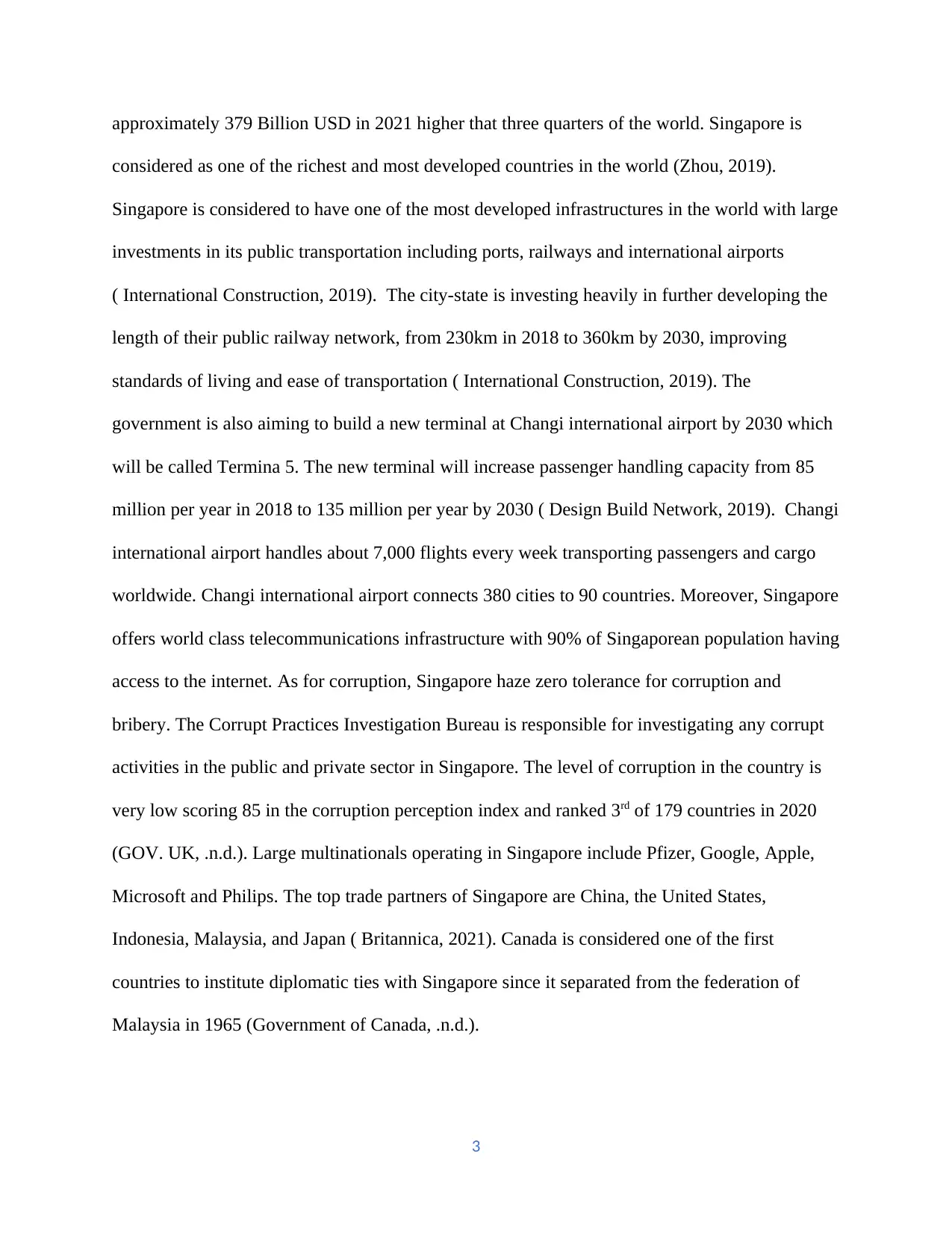
approximately 379 Billion USD in 2021 higher that three quarters of the world. Singapore is
considered as one of the richest and most developed countries in the world (Zhou, 2019).
Singapore is considered to have one of the most developed infrastructures in the world with large
investments in its public transportation including ports, railways and international airports
( International Construction, 2019). The city-state is investing heavily in further developing the
length of their public railway network, from 230km in 2018 to 360km by 2030, improving
standards of living and ease of transportation ( International Construction, 2019). The
government is also aiming to build a new terminal at Changi international airport by 2030 which
will be called Termina 5. The new terminal will increase passenger handling capacity from 85
million per year in 2018 to 135 million per year by 2030 ( Design Build Network, 2019). Changi
international airport handles about 7,000 flights every week transporting passengers and cargo
worldwide. Changi international airport connects 380 cities to 90 countries. Moreover, Singapore
offers world class telecommunications infrastructure with 90% of Singaporean population having
access to the internet. As for corruption, Singapore haze zero tolerance for corruption and
bribery. The Corrupt Practices Investigation Bureau is responsible for investigating any corrupt
activities in the public and private sector in Singapore. The level of corruption in the country is
very low scoring 85 in the corruption perception index and ranked 3rd of 179 countries in 2020
(GOV. UK, .n.d.). Large multinationals operating in Singapore include Pfizer, Google, Apple,
Microsoft and Philips. The top trade partners of Singapore are China, the United States,
Indonesia, Malaysia, and Japan ( Britannica, 2021). Canada is considered one of the first
countries to institute diplomatic ties with Singapore since it separated from the federation of
Malaysia in 1965 (Government of Canada, .n.d.).
3
considered as one of the richest and most developed countries in the world (Zhou, 2019).
Singapore is considered to have one of the most developed infrastructures in the world with large
investments in its public transportation including ports, railways and international airports
( International Construction, 2019). The city-state is investing heavily in further developing the
length of their public railway network, from 230km in 2018 to 360km by 2030, improving
standards of living and ease of transportation ( International Construction, 2019). The
government is also aiming to build a new terminal at Changi international airport by 2030 which
will be called Termina 5. The new terminal will increase passenger handling capacity from 85
million per year in 2018 to 135 million per year by 2030 ( Design Build Network, 2019). Changi
international airport handles about 7,000 flights every week transporting passengers and cargo
worldwide. Changi international airport connects 380 cities to 90 countries. Moreover, Singapore
offers world class telecommunications infrastructure with 90% of Singaporean population having
access to the internet. As for corruption, Singapore haze zero tolerance for corruption and
bribery. The Corrupt Practices Investigation Bureau is responsible for investigating any corrupt
activities in the public and private sector in Singapore. The level of corruption in the country is
very low scoring 85 in the corruption perception index and ranked 3rd of 179 countries in 2020
(GOV. UK, .n.d.). Large multinationals operating in Singapore include Pfizer, Google, Apple,
Microsoft and Philips. The top trade partners of Singapore are China, the United States,
Indonesia, Malaysia, and Japan ( Britannica, 2021). Canada is considered one of the first
countries to institute diplomatic ties with Singapore since it separated from the federation of
Malaysia in 1965 (Government of Canada, .n.d.).
3
⊘ This is a preview!⊘
Do you want full access?
Subscribe today to unlock all pages.

Trusted by 1+ million students worldwide
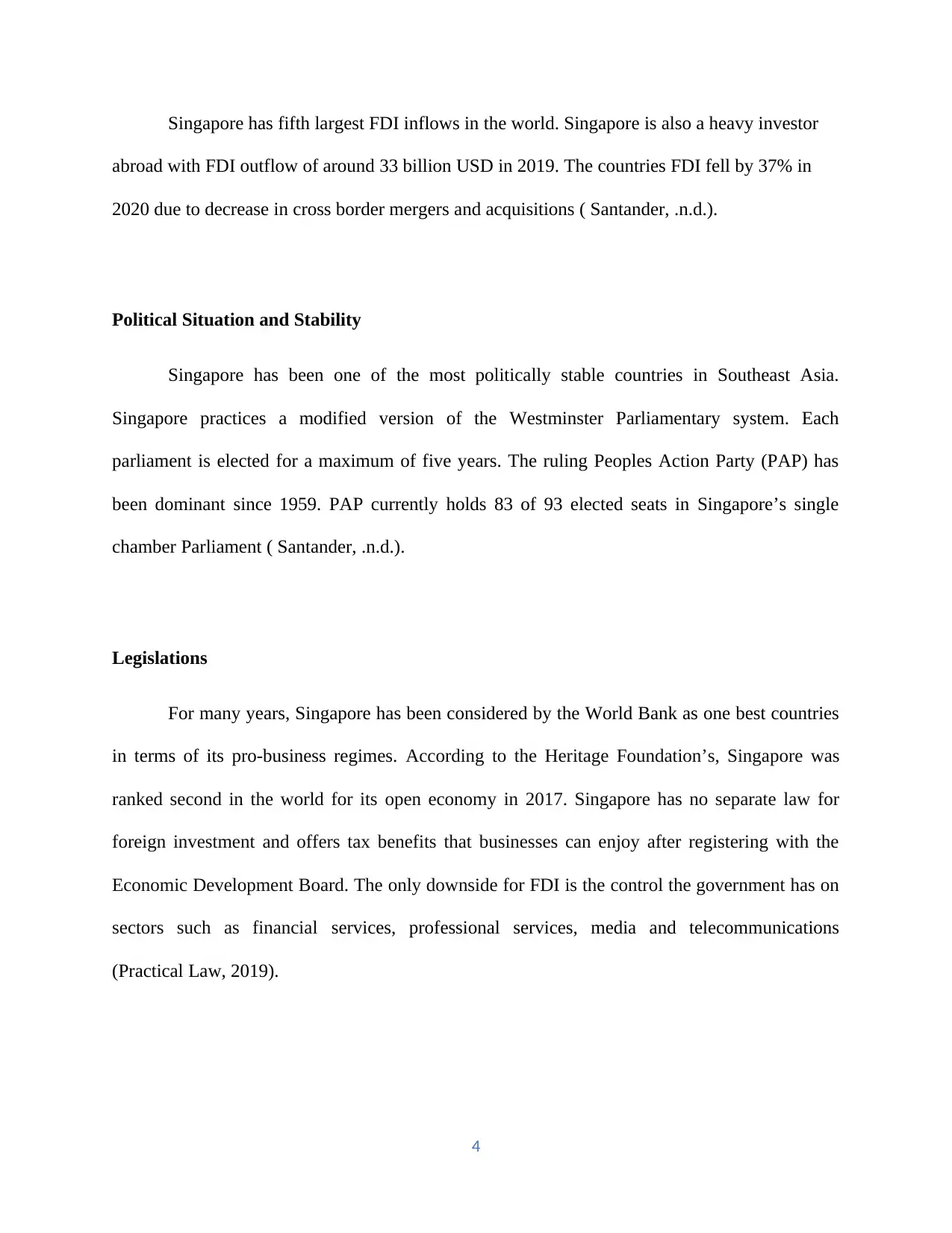
Singapore has fifth largest FDI inflows in the world. Singapore is also a heavy investor
abroad with FDI outflow of around 33 billion USD in 2019. The countries FDI fell by 37% in
2020 due to decrease in cross border mergers and acquisitions ( Santander, .n.d.).
Political Situation and Stability
Singapore has been one of the most politically stable countries in Southeast Asia.
Singapore practices a modified version of the Westminster Parliamentary system. Each
parliament is elected for a maximum of five years. The ruling Peoples Action Party (PAP) has
been dominant since 1959. PAP currently holds 83 of 93 elected seats in Singapore’s single
chamber Parliament ( Santander, .n.d.).
Legislations
For many years, Singapore has been considered by the World Bank as one best countries
in terms of its pro-business regimes. According to the Heritage Foundation’s, Singapore was
ranked second in the world for its open economy in 2017. Singapore has no separate law for
foreign investment and offers tax benefits that businesses can enjoy after registering with the
Economic Development Board. The only downside for FDI is the control the government has on
sectors such as financial services, professional services, media and telecommunications
(Practical Law, 2019).
4
abroad with FDI outflow of around 33 billion USD in 2019. The countries FDI fell by 37% in
2020 due to decrease in cross border mergers and acquisitions ( Santander, .n.d.).
Political Situation and Stability
Singapore has been one of the most politically stable countries in Southeast Asia.
Singapore practices a modified version of the Westminster Parliamentary system. Each
parliament is elected for a maximum of five years. The ruling Peoples Action Party (PAP) has
been dominant since 1959. PAP currently holds 83 of 93 elected seats in Singapore’s single
chamber Parliament ( Santander, .n.d.).
Legislations
For many years, Singapore has been considered by the World Bank as one best countries
in terms of its pro-business regimes. According to the Heritage Foundation’s, Singapore was
ranked second in the world for its open economy in 2017. Singapore has no separate law for
foreign investment and offers tax benefits that businesses can enjoy after registering with the
Economic Development Board. The only downside for FDI is the control the government has on
sectors such as financial services, professional services, media and telecommunications
(Practical Law, 2019).
4
Paraphrase This Document
Need a fresh take? Get an instant paraphrase of this document with our AI Paraphraser
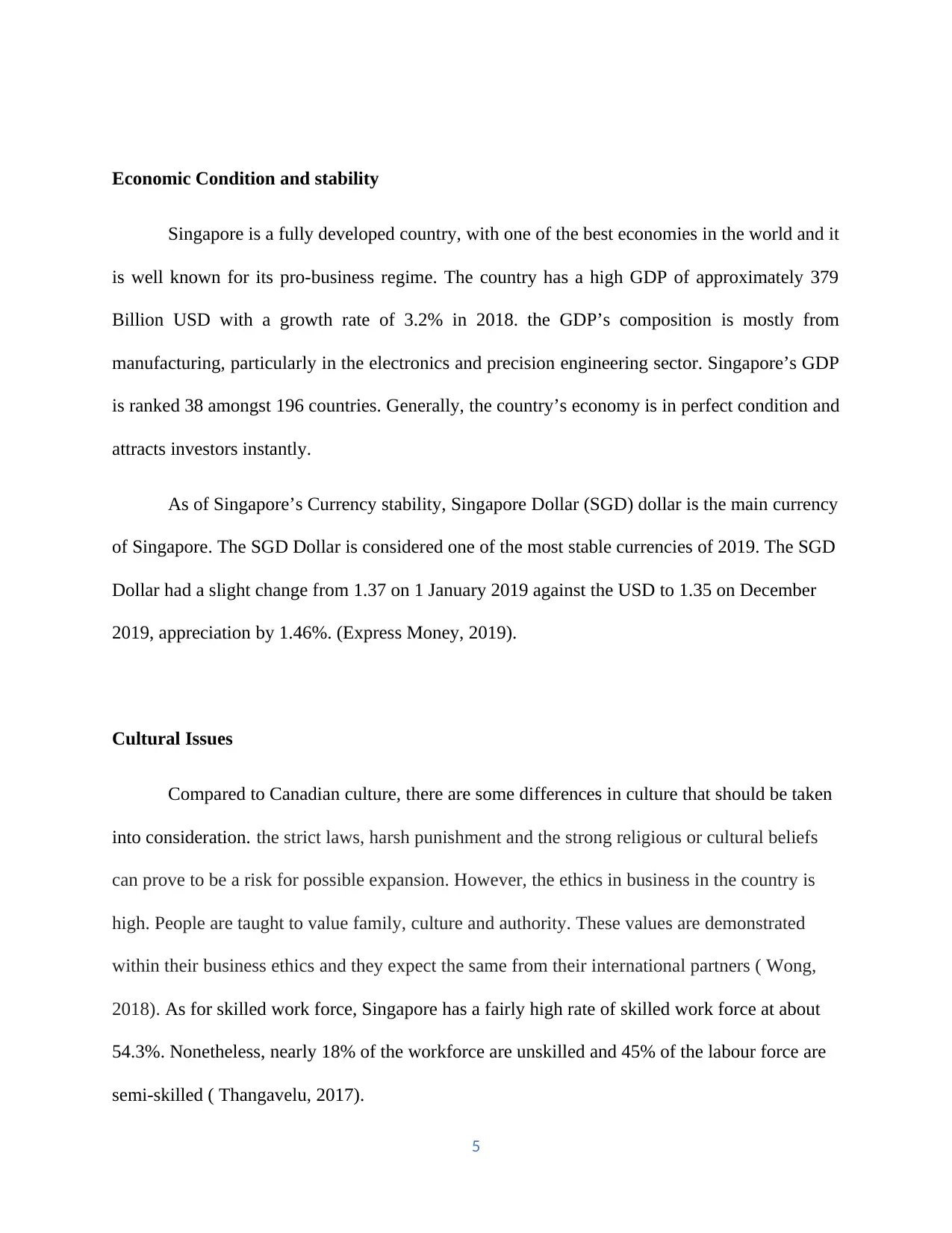
Economic Condition and stability
Singapore is a fully developed country, with one of the best economies in the world and it
is well known for its pro-business regime. The country has a high GDP of approximately 379
Billion USD with a growth rate of 3.2% in 2018. the GDP’s composition is mostly from
manufacturing, particularly in the electronics and precision engineering sector. Singapore’s GDP
is ranked 38 amongst 196 countries. Generally, the country’s economy is in perfect condition and
attracts investors instantly.
As of Singapore’s Currency stability, Singapore Dollar (SGD) dollar is the main currency
of Singapore. The SGD Dollar is considered one of the most stable currencies of 2019. The SGD
Dollar had a slight change from 1.37 on 1 January 2019 against the USD to 1.35 on December
2019, appreciation by 1.46%. (Express Money, 2019).
Cultural Issues
Compared to Canadian culture, there are some differences in culture that should be taken
into consideration. the strict laws, harsh punishment and the strong religious or cultural beliefs
can prove to be a risk for possible expansion. However, the ethics in business in the country is
high. People are taught to value family, culture and authority. These values are demonstrated
within their business ethics and they expect the same from their international partners ( Wong,
2018). As for skilled work force, Singapore has a fairly high rate of skilled work force at about
54.3%. Nonetheless, nearly 18% of the workforce are unskilled and 45% of the labour force are
semi-skilled ( Thangavelu, 2017).
5
Singapore is a fully developed country, with one of the best economies in the world and it
is well known for its pro-business regime. The country has a high GDP of approximately 379
Billion USD with a growth rate of 3.2% in 2018. the GDP’s composition is mostly from
manufacturing, particularly in the electronics and precision engineering sector. Singapore’s GDP
is ranked 38 amongst 196 countries. Generally, the country’s economy is in perfect condition and
attracts investors instantly.
As of Singapore’s Currency stability, Singapore Dollar (SGD) dollar is the main currency
of Singapore. The SGD Dollar is considered one of the most stable currencies of 2019. The SGD
Dollar had a slight change from 1.37 on 1 January 2019 against the USD to 1.35 on December
2019, appreciation by 1.46%. (Express Money, 2019).
Cultural Issues
Compared to Canadian culture, there are some differences in culture that should be taken
into consideration. the strict laws, harsh punishment and the strong religious or cultural beliefs
can prove to be a risk for possible expansion. However, the ethics in business in the country is
high. People are taught to value family, culture and authority. These values are demonstrated
within their business ethics and they expect the same from their international partners ( Wong,
2018). As for skilled work force, Singapore has a fairly high rate of skilled work force at about
54.3%. Nonetheless, nearly 18% of the workforce are unskilled and 45% of the labour force are
semi-skilled ( Thangavelu, 2017).
5
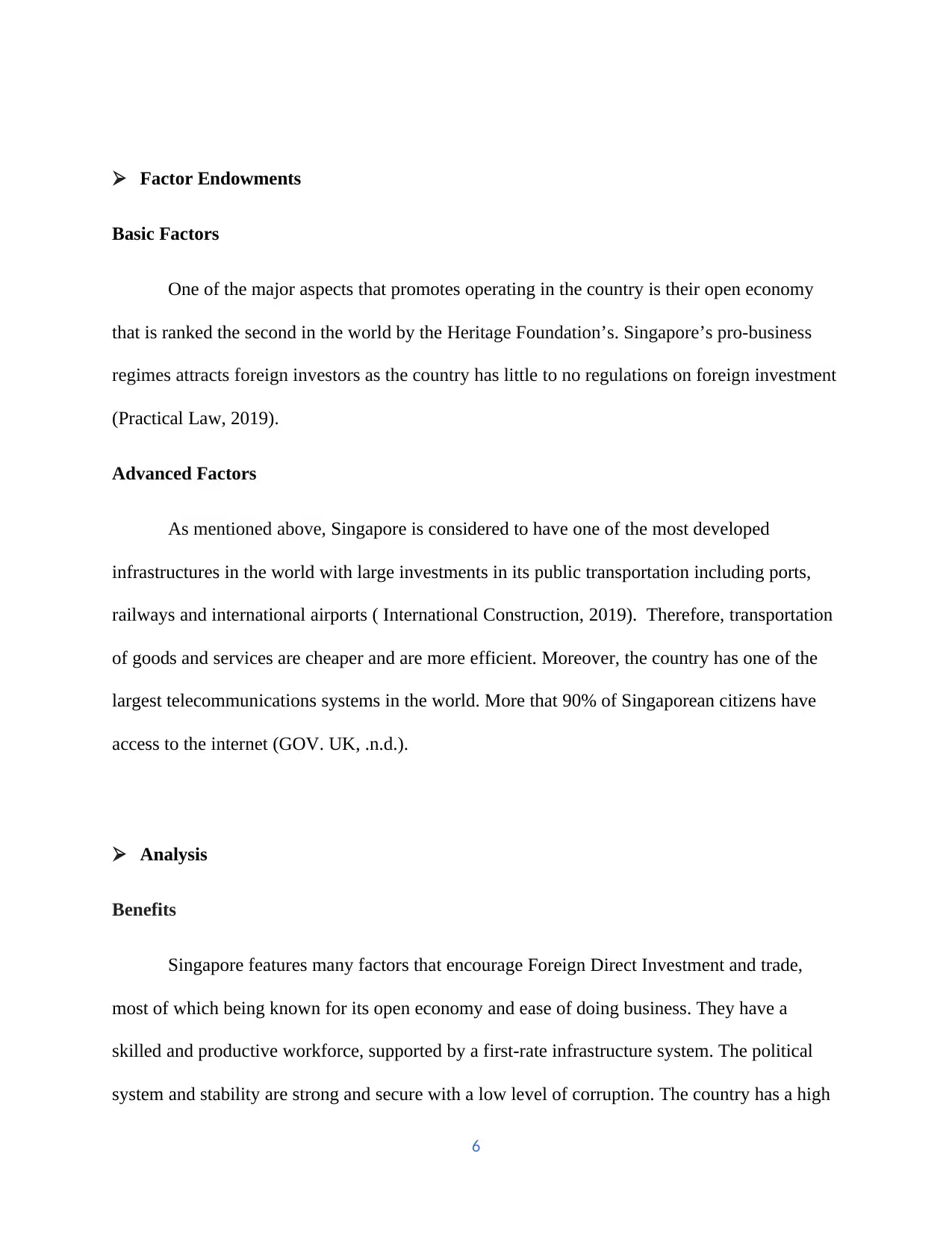
Factor Endowments
Basic Factors
One of the major aspects that promotes operating in the country is their open economy
that is ranked the second in the world by the Heritage Foundation’s. Singapore’s pro-business
regimes attracts foreign investors as the country has little to no regulations on foreign investment
(Practical Law, 2019).
Advanced Factors
As mentioned above, Singapore is considered to have one of the most developed
infrastructures in the world with large investments in its public transportation including ports,
railways and international airports ( International Construction, 2019). Therefore, transportation
of goods and services are cheaper and are more efficient. Moreover, the country has one of the
largest telecommunications systems in the world. More that 90% of Singaporean citizens have
access to the internet (GOV. UK, .n.d.).
Analysis
Benefits
Singapore features many factors that encourage Foreign Direct Investment and trade,
most of which being known for its open economy and ease of doing business. They have a
skilled and productive workforce, supported by a first-rate infrastructure system. The political
system and stability are strong and secure with a low level of corruption. The country has a high
6
Basic Factors
One of the major aspects that promotes operating in the country is their open economy
that is ranked the second in the world by the Heritage Foundation’s. Singapore’s pro-business
regimes attracts foreign investors as the country has little to no regulations on foreign investment
(Practical Law, 2019).
Advanced Factors
As mentioned above, Singapore is considered to have one of the most developed
infrastructures in the world with large investments in its public transportation including ports,
railways and international airports ( International Construction, 2019). Therefore, transportation
of goods and services are cheaper and are more efficient. Moreover, the country has one of the
largest telecommunications systems in the world. More that 90% of Singaporean citizens have
access to the internet (GOV. UK, .n.d.).
Analysis
Benefits
Singapore features many factors that encourage Foreign Direct Investment and trade,
most of which being known for its open economy and ease of doing business. They have a
skilled and productive workforce, supported by a first-rate infrastructure system. The political
system and stability are strong and secure with a low level of corruption. The country has a high
6
⊘ This is a preview!⊘
Do you want full access?
Subscribe today to unlock all pages.

Trusted by 1+ million students worldwide
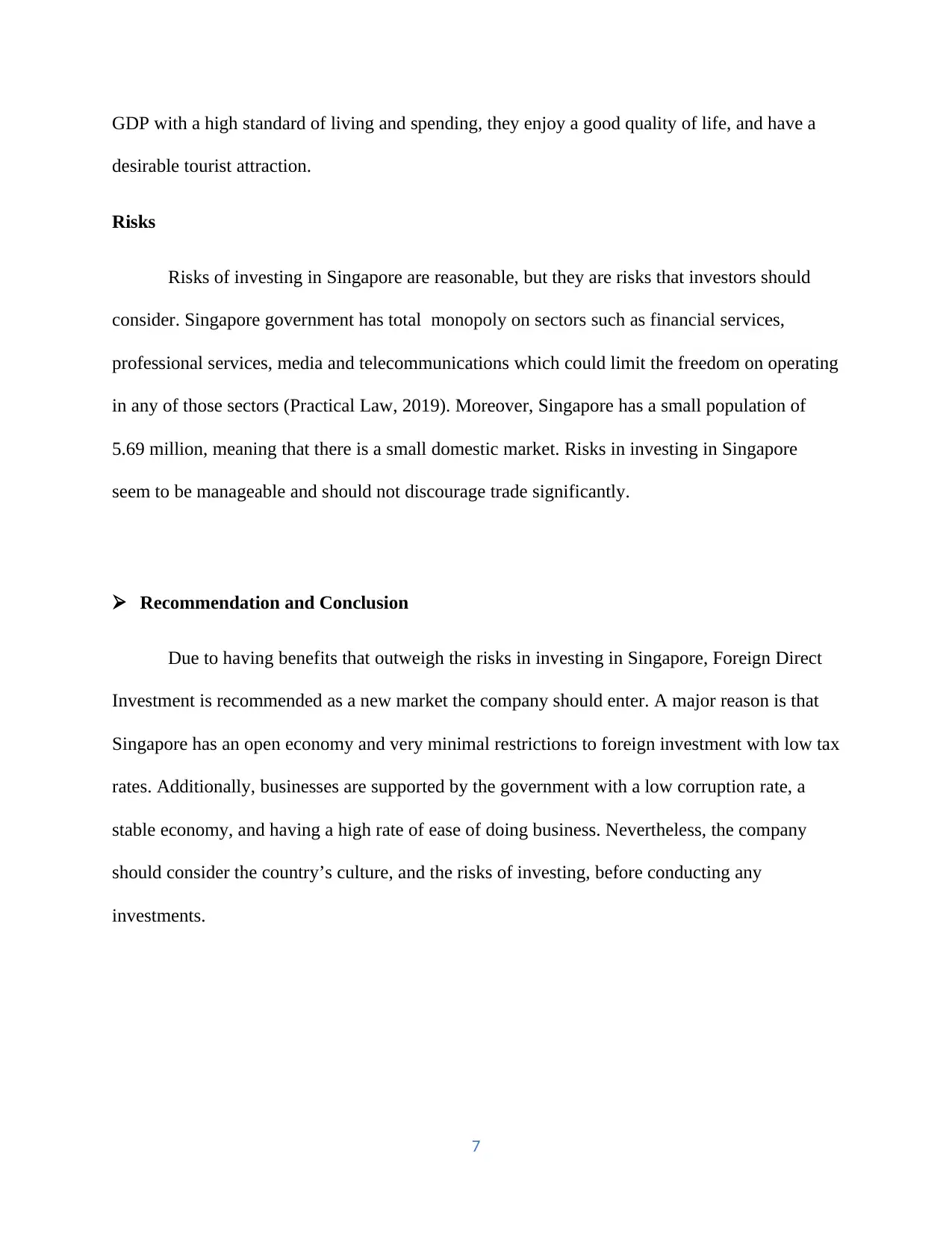
GDP with a high standard of living and spending, they enjoy a good quality of life, and have a
desirable tourist attraction.
Risks
Risks of investing in Singapore are reasonable, but they are risks that investors should
consider. Singapore government has total monopoly on sectors such as financial services,
professional services, media and telecommunications which could limit the freedom on operating
in any of those sectors (Practical Law, 2019). Moreover, Singapore has a small population of
5.69 million, meaning that there is a small domestic market. Risks in investing in Singapore
seem to be manageable and should not discourage trade significantly.
Recommendation and Conclusion
Due to having benefits that outweigh the risks in investing in Singapore, Foreign Direct
Investment is recommended as a new market the company should enter. A major reason is that
Singapore has an open economy and very minimal restrictions to foreign investment with low tax
rates. Additionally, businesses are supported by the government with a low corruption rate, a
stable economy, and having a high rate of ease of doing business. Nevertheless, the company
should consider the country’s culture, and the risks of investing, before conducting any
investments.
7
desirable tourist attraction.
Risks
Risks of investing in Singapore are reasonable, but they are risks that investors should
consider. Singapore government has total monopoly on sectors such as financial services,
professional services, media and telecommunications which could limit the freedom on operating
in any of those sectors (Practical Law, 2019). Moreover, Singapore has a small population of
5.69 million, meaning that there is a small domestic market. Risks in investing in Singapore
seem to be manageable and should not discourage trade significantly.
Recommendation and Conclusion
Due to having benefits that outweigh the risks in investing in Singapore, Foreign Direct
Investment is recommended as a new market the company should enter. A major reason is that
Singapore has an open economy and very minimal restrictions to foreign investment with low tax
rates. Additionally, businesses are supported by the government with a low corruption rate, a
stable economy, and having a high rate of ease of doing business. Nevertheless, the company
should consider the country’s culture, and the risks of investing, before conducting any
investments.
7
Paraphrase This Document
Need a fresh take? Get an instant paraphrase of this document with our AI Paraphraser
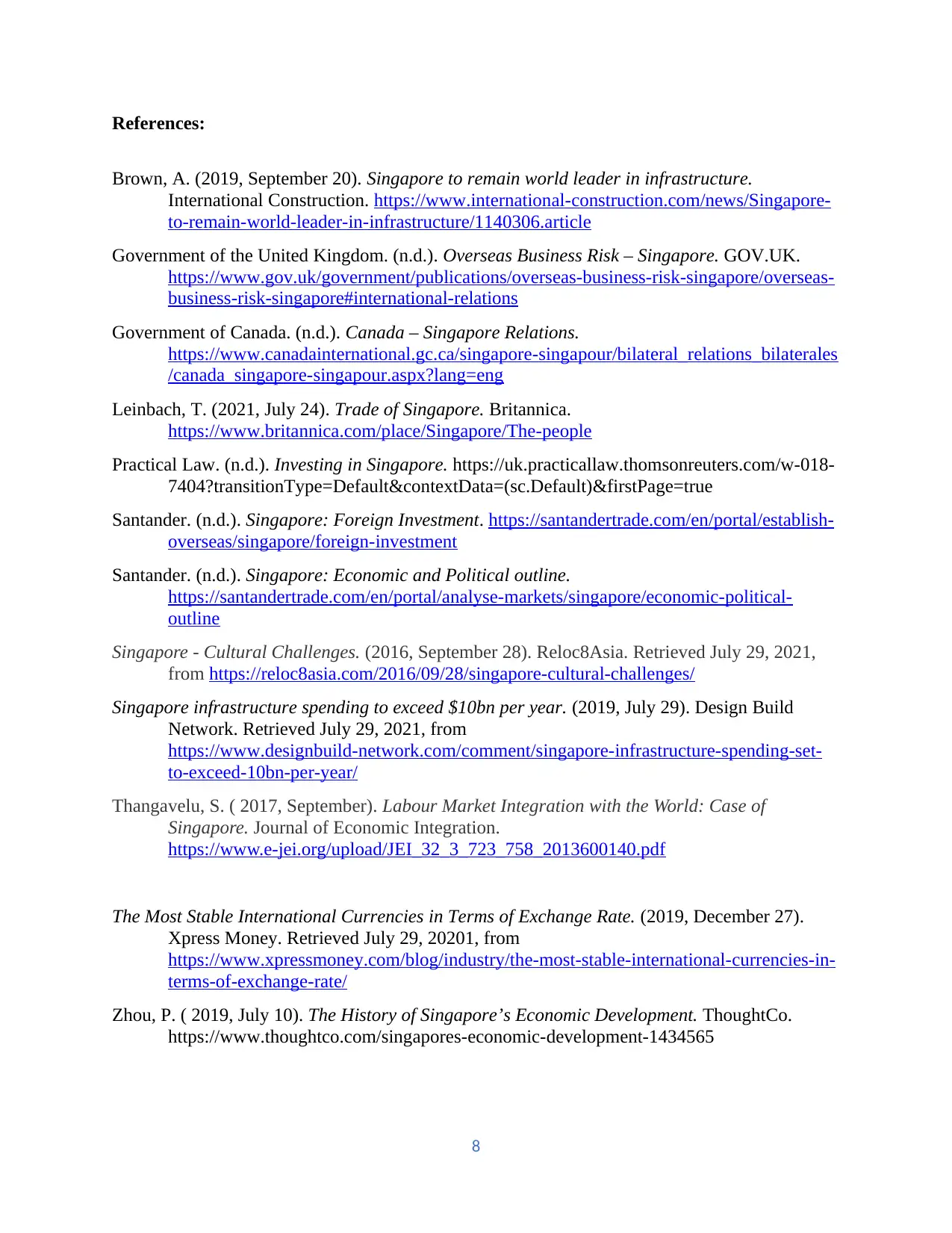
References:
Brown, A. (2019, September 20). Singapore to remain world leader in infrastructure.
International Construction. https://www.international-construction.com/news/Singapore-
to-remain-world-leader-in-infrastructure/1140306.article
Government of the United Kingdom. (n.d.). Overseas Business Risk – Singapore. GOV.UK.
https://www.gov.uk/government/publications/overseas-business-risk-singapore/overseas-
business-risk-singapore#international-relations
Government of Canada. (n.d.). Canada – Singapore Relations.
https://www.canadainternational.gc.ca/singapore-singapour/bilateral_relations_bilaterales
/canada_singapore-singapour.aspx?lang=eng
Leinbach, T. (2021, July 24). Trade of Singapore. Britannica.
https://www.britannica.com/place/Singapore/The-people
Practical Law. (n.d.). Investing in Singapore. https://uk.practicallaw.thomsonreuters.com/w-018-
7404?transitionType=Default&contextData=(sc.Default)&firstPage=true
Santander. (n.d.). Singapore: Foreign Investment. https://santandertrade.com/en/portal/establish-
overseas/singapore/foreign-investment
Santander. (n.d.). Singapore: Economic and Political outline.
https://santandertrade.com/en/portal/analyse-markets/singapore/economic-political-
outline
Singapore - Cultural Challenges. (2016, September 28). Reloc8Asia. Retrieved July 29, 2021,
from https://reloc8asia.com/2016/09/28/singapore-cultural-challenges/
Singapore infrastructure spending to exceed $10bn per year. (2019, July 29). Design Build
Network. Retrieved July 29, 2021, from
https://www.designbuild-network.com/comment/singapore-infrastructure-spending-set-
to-exceed-10bn-per-year/
Thangavelu, S. ( 2017, September). Labour Market Integration with the World: Case of
Singapore. Journal of Economic Integration.
https://www.e-jei.org/upload/JEI_32_3_723_758_2013600140.pdf
The Most Stable International Currencies in Terms of Exchange Rate. (2019, December 27).
Xpress Money. Retrieved July 29, 20201, from
https://www.xpressmoney.com/blog/industry/the-most-stable-international-currencies-in-
terms-of-exchange-rate/
Zhou, P. ( 2019, July 10). The History of Singapore’s Economic Development. ThoughtCo.
https://www.thoughtco.com/singapores-economic-development-1434565
8
Brown, A. (2019, September 20). Singapore to remain world leader in infrastructure.
International Construction. https://www.international-construction.com/news/Singapore-
to-remain-world-leader-in-infrastructure/1140306.article
Government of the United Kingdom. (n.d.). Overseas Business Risk – Singapore. GOV.UK.
https://www.gov.uk/government/publications/overseas-business-risk-singapore/overseas-
business-risk-singapore#international-relations
Government of Canada. (n.d.). Canada – Singapore Relations.
https://www.canadainternational.gc.ca/singapore-singapour/bilateral_relations_bilaterales
/canada_singapore-singapour.aspx?lang=eng
Leinbach, T. (2021, July 24). Trade of Singapore. Britannica.
https://www.britannica.com/place/Singapore/The-people
Practical Law. (n.d.). Investing in Singapore. https://uk.practicallaw.thomsonreuters.com/w-018-
7404?transitionType=Default&contextData=(sc.Default)&firstPage=true
Santander. (n.d.). Singapore: Foreign Investment. https://santandertrade.com/en/portal/establish-
overseas/singapore/foreign-investment
Santander. (n.d.). Singapore: Economic and Political outline.
https://santandertrade.com/en/portal/analyse-markets/singapore/economic-political-
outline
Singapore - Cultural Challenges. (2016, September 28). Reloc8Asia. Retrieved July 29, 2021,
from https://reloc8asia.com/2016/09/28/singapore-cultural-challenges/
Singapore infrastructure spending to exceed $10bn per year. (2019, July 29). Design Build
Network. Retrieved July 29, 2021, from
https://www.designbuild-network.com/comment/singapore-infrastructure-spending-set-
to-exceed-10bn-per-year/
Thangavelu, S. ( 2017, September). Labour Market Integration with the World: Case of
Singapore. Journal of Economic Integration.
https://www.e-jei.org/upload/JEI_32_3_723_758_2013600140.pdf
The Most Stable International Currencies in Terms of Exchange Rate. (2019, December 27).
Xpress Money. Retrieved July 29, 20201, from
https://www.xpressmoney.com/blog/industry/the-most-stable-international-currencies-in-
terms-of-exchange-rate/
Zhou, P. ( 2019, July 10). The History of Singapore’s Economic Development. ThoughtCo.
https://www.thoughtco.com/singapores-economic-development-1434565
8
1 out of 8
Related Documents
Your All-in-One AI-Powered Toolkit for Academic Success.
+13062052269
info@desklib.com
Available 24*7 on WhatsApp / Email
![[object Object]](/_next/static/media/star-bottom.7253800d.svg)
Unlock your academic potential
Copyright © 2020–2026 A2Z Services. All Rights Reserved. Developed and managed by ZUCOL.





